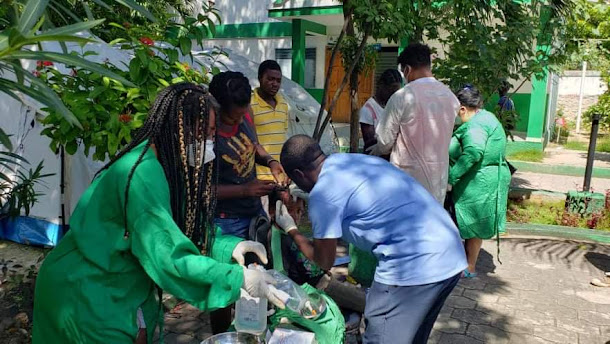International aid on its way as Haiti reels from latest earthquake
 Doctors from Cuba assist earthquake victims in Haiti on Aug. 14, 2021. Photo from Cuba’s Ministry of Foreign Affairs. Hours after a 7.2 magnitude earthquake hit southwestern Haiti, killing at least 300 people, countries and international organizations pledged to assist with relief and support. The earthquake struck multiple cities along the coast, including Les Cayes, Jérémie, and Saint Louis-du-Sud. Graphic by Leonardo March. |
Now, the death toll has reached 1,941 people and the countries who originally planned aid are going into more specifics of how they will assist.
Here’s a roundup of countries, mostly Haiti’s closest neighbors, that say they plan to help.
Argentina
Argentina’s Ministry of Foreign Affairs released a press statement on its official website.
“The Argentine government is at your disposal to collaborate in this difficult time,” the statement said.
On Aug. 15, the Ministry of Foreign Affairs released a statement detailing specifically what they plan to do to help, mainly working with other non-governmental organizations who have arrived in the country. Foreign Minister Felipe Sóla will be working with his White Helmet Commission to provide health care and volunteers for shelters, as well as monitoring the sanitation needs.
Chile
Chilean President Sebastian Piñera stated that Chile has been in contact with Haitian authorities and his country is preparing a shipment of humanitarian aid.
Piñera tweeted again the day after the earthquake, reiterating the scale of the tragedy and going into more details about their aid efforts.
“Today Chile is sending humanitarian aid, medicines, sanitary items, food, among others that the Haitian people need,” he said.
The plane arrived on the following day with the aforementioned supplies.
Colombia
Colombia — the center of much international attention following the assassination of Jovenel Moïse after its former military-turned mercenaries were embroiled in the killing — will provide assistance in removing debris and helping rescue those currently unaccounted for, said Vice President Marta Lucía Ramírez.
On Aug. 15, President Iván Duque announced that the Colombian Air Force was heading to Haiti to help in rescue efforts and provide 18 tons of equipment to save lives.
They sent two planes the following day with 30 professionals, 2 dogs, and search-and-rescue equipment, as well as medical supplies.
Cuba
Cuba’s Minister of Exterior Relations shared photos of Cuban doctors helping the wounded in Haiti, alongside the hashtags “Cuban Solidarity” and “Cuba Saves Lives.”
Bruno Rodríguez, Cuba’s Minister of Foreign Affairs, tweeted his condolences alongside one of the photos of Cuban medical professionals in Haiti.
Dominican Republic
Neighboring Caribbean countries are also pledging support, including the Dominican Republic.
“I have instructed the Minister of Foreign Affairs to communicate with the Haitian Prime Minister to facilitate any assistance within our means,” tweeted President Luis Abinader.
As of Aug. 16, the Dominican Republic has provided two million masks, hand sanitizers, wheelchairs, circuits, suture kits, cotton, needles and robes. They also have a helicopter centered at the Jimaní province in case emergency transfers are needed to Jacmel.
“10,000 rations of food and medicines were ordered by sea through boats departing from Cabo Rojo and Manzanillo. Inside are medicines, antivirals, painkillers, vitamins, mucolytics, and acetaminophen,” said the government.
Ecuador
The Ecuadorian government released an official statement the day of the earthquake, stating “feelings of regret, solidarity, and friendship with the people and government of Haiti.”
The next day, they sent search-and-rescue teams to the earthquake site.
Jamaica
Jamaica’s Prime Minister Andrew Holness has stated his sympathy, also on Twitter, but has yet to come forth with any announcement of aid.
Mexico
Mexican President Andrés Manuel López Obrador announced that he planned to help through the country’s National Coordination of Civil Protection and the Secretaries of Foreign Relations, as well as the Navy and the National Defense.
The government sent their first shipment of emergency aid the next day.
Panama
Panama’s Foreign Ministry expressed solidarity with Haiti and promised to send humanitarian assistance.
A day later, they announced a donation drive to send canned food, bottled water, blankets, tents, and hygiene kits to Haiti.
United States
President Joe Biden pledged to send aid after being briefed on the disaster. He appointed Samantha Power, Administrator of the United States Agency for International Development (USAID), to spearhead the response.
Power said that she plans to deploy 65 people to aid with search-and-rescue efforts, as well as supply “specialized tools, equipment, and medical supplies to assist in search operations.”
In addition, 38 disaster experts from USAID’s Bureau for Humanitarian Assistance have arrived. Eight helicopters from the U.S. Southern Command are helping transport supplies and personnel, while the U.S. Coast Guard is conducting medevac missions.
In the U.S., members of the Congressional Haiti Caucus, which includes Congressmembers Andy Levin, Yvette Clarke, Val Demings, Ayanna Presley, and Mondaire Jones, released their own statement.
“We remain committed to championing adequate aid to the region, supporting bilateral relations and policies that will ensure Haiti’s full economic and political recovery, and the emergence of a durable, Haitian-led democracy,” they said.
Venezuela
The Venezuelan government began deploying planes to Haiti the day after the earthquake carrying 30 tons of water, food, and medical supplies.
This update was originally published in The Haitian Times.



Comments